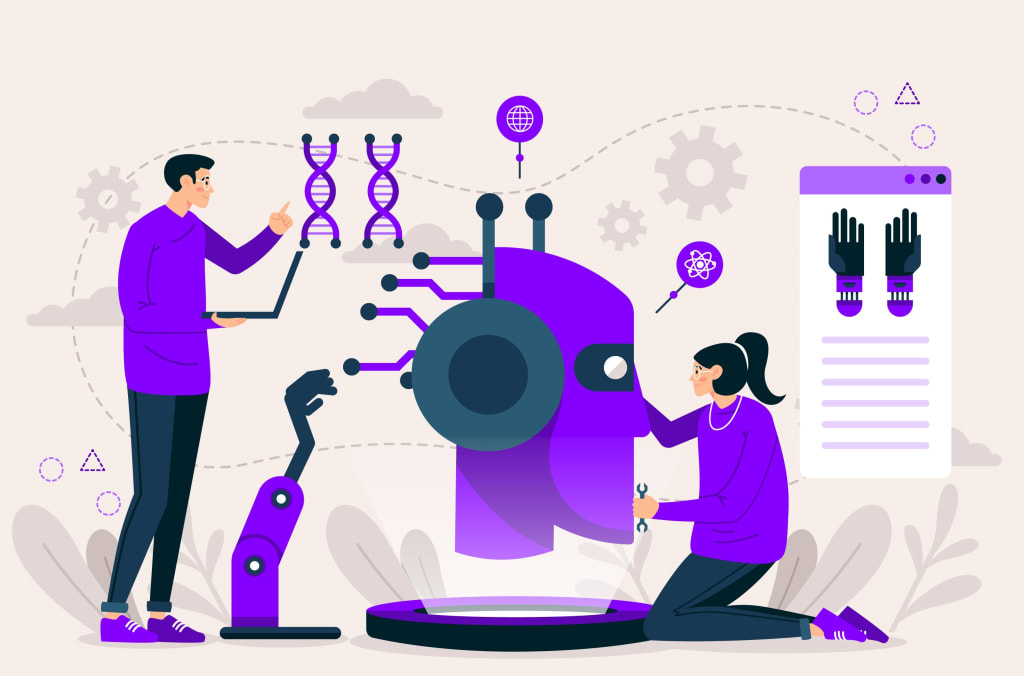HOW AI IS RESHAPING REVENUE GENERATION IN E-COMMERCE
AI app development

Introduction
In the rapidly evolving world of ecommerce, businesses face a multitude of challenges, ranging from attracting and retaining customers to managing inventory and providing personalized experiences. To overcome these hurdles and drive revenue growth, many ecommerce businesses are turning to artificial intelligence (AI) technology. This powerful tool has proven to be a game-changer in the industry, enabling businesses to enhance customer experiences, streamline operations, and make data-driven decisions.
With the exponential growth of digital commerce sales in recent years, retailers have recognized the significance of providing a seamless customer experience. As a result, chatbots have emerged as a ubiquitous customer service tool, effectively addressing common inquiries and helping consumers track their purchases. In fact, 35% of companies have already implemented AI technology, while an additional 42% are actively exploring ways to incorporate this transformative technology in the near future. In light of the prevailing discourse on the potential impact of artificial intelligence on eCommerce, it is worth considering what this paradigm shift will truly entail.
In this blog post, we will explore why integrating AI technology into ecommerce app development can effectively address core challenges and drive revenue growth.
Personalized Customer Experiences
One of the primary challenges for ecommerce businesses is delivering personalized experiences to customers. AI technology through AI app development enables businesses to gather and analyze vast amounts of customer data, including browsing history, purchase patterns, and preferences. By leveraging this data, ecommerce apps can provide tailored product recommendations, personalized offers, and targeted marketing campaigns.
Improved Search and Discovery
In a vast sea of products, it is crucial for ecommerce businesses to help customers find the right products quickly and easily. AI-powered search algorithms can significantly enhance the search and discovery process. Natural Language Processing (NLP) techniques enable ecommerce apps to understand customer queries more accurately and provide relevant search results. Advanced image recognition technology further enhances the search experience by allowing customers to search for products using images.
Efficient Inventory Management
Effective inventory management is critical for ecommerce businesses to ensure that products are available when customers need them. AI technology can analyze historical sales data, market trends, and external factors to predict demand accurately. This enables businesses to optimize inventory levels, reduce overstocking or understocking, and avoid missed sales opportunities. By improving inventory management, ecommerce apps can minimize costs, increase operational efficiency, and maximize revenue.
Intelligent Pricing and Dynamic Pricing
Pricing products competitively is a constant challenge in the ecommerce industry. AI technology can help businesses determine optimal pricing strategies by analyzing market conditions, competitor pricing, and customer behavior. Intelligent pricing algorithms can dynamically adjust prices in real-time, maximizing revenue while remaining competitive. By leveraging AI for pricing decisions, ecommerce apps can stay ahead of the competition, increase profit margins, and drive revenue growth.
Fraud Detection and Prevention
Ecommerce businesses are vulnerable to fraudulent activities such as identity theft, credit card fraud, and account takeovers. AI-powered fraud detection systems can analyze patterns and anomalies in real-time to identify and prevent fraudulent transactions. Machine learning algorithms can continuously learn and adapt to evolving fraud techniques, providing robust protection for both businesses and customers. By implementing AI-powered fraud detection systems, ecommerce apps can safeguard customer trust, minimize financial losses, and maintain a secure environment for online transactions.
How to Implement AI?
Implementing artificial intelligence (AI) into ecommerce requires careful planning and execution. Here are some key steps to follow when integrating AI technology into your ecommerce platform:
Identify Business Goals and Use Cases: Begin by defining your business goals and identifying specific areas where AI can make a significant impact. Consider and Prioritize the use cases based on their potential for driving revenue growth and improving customer experience.
Gather and Prepare Data: AI relies on data to train models and make accurate predictions. Collect and organize relevant data from various sources, including customer behavior, transaction history, product catalog, and market trends. Ensure that the data is clean, structured, and properly labeled to enable effective machine learning.
Choose AI Tools and Technologies: Select the AI tools and technologies that best align with your use cases and business requirements. There are several options available, including pre-built AI solutions, open-source libraries, and cloud-based AI platforms. Evaluate their features, scalability, integration capabilities, and ease of use before making a decision.
Build or Deploy AI Models: Depending on your resources and expertise, you can either build custom AI models or leverage existing models for your use cases. For instance, you can use machine learning algorithms to develop personalized recommendation systems or natural language processing techniques for chatbots and customer support automation. If necessary, collaborate with AI experts or consider outsourcing the development to specialized AI service providers.
Integrate AI into Ecommerce Platform: Integrate the AI models and algorithms into your ecommerce platform seamlessly. This involves connecting AI components with your existing systems, databases, and APIs. Ensure that the AI functionality works harmoniously with the overall user experience and doesn't disrupt the existing workflows.
Monitor and Refine: Once the AI technology is implemented, continuously monitor its performance and gather feedback. Use analytics and metrics to assess the effectiveness of AI-driven features and their impact on key performance indicators such as conversion rates, customer engagement, and revenue. Refine the AI models and algorithms based on the insights gained from monitoring and user feedback.
Stay Updated and Evolve: AI technology is evolving rapidly, and it is crucial to stay updated with the latest advancements and trends. Keep an eye on emerging AI technologies, industry best practices, and new use cases that can further enhance your ecommerce operations. Continuously evolve your AI implementation to stay competitive in the ever-changing ecommerce landscape.
Remember, implementing AI into ecommerce is an iterative process that requires ongoing monitoring, optimization, and adaptation. By strategically incorporating AI technologies, you can definitely unlock new opportunities, improve customer experiences, and drive revenue growth in the dynamic world of ecommerce as mentioned above.
Conclusion
Incorporating AI technology into ecommerce apps offers numerous benefits, from delivering personalized customer experiences to improving inventory management, pricing strategies, and fraud detection. As the ecommerce landscape continues to evolve, AI technology will play an increasingly vital role in shaping the industry's future. By embracing AI, businesses can stay competitive, adapt to changing customer needs, and position themselves for long-term growth and success in the ecommerce marketplace.
If you're considering implementing AI technology into your ecommerce platform, partnering with an experienced AI app development company like Katchin Tech can provide valuable expertise and guidance. Our team of AI experts can assist you in gathering and preparing data, choosing the right AI tools and technologies, building or deploying AI models, and monitoring and refining the AI implementation. Our commitment to staying updated with the latest advancements in AI ensures that your ecommerce platform remains at the forefront of innovation.





Comments
There are no comments for this story
Be the first to respond and start the conversation.